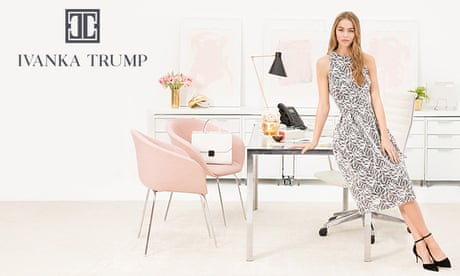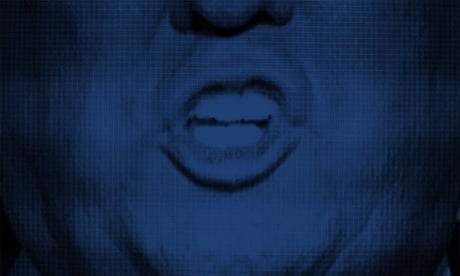The resistance: 1, Ivanka Trump: 0
Nordstrom’s decision to drop Ivanka’s brand hit the Trumps where it hurt – and shows how boycotts have a rightful place in the resistance
 ‘Why should Ivanka get a pass just because she has shiny hair and avoids all but a narrow range of topics’ Photograph: Kevin Lamarque/Reuters
‘Why should Ivanka get a pass just because she has shiny hair and avoids all but a narrow range of topics’ Photograph: Kevin Lamarque/ReutersIvanka Trump spent the election trying to pull off a delicate balancing act: campaigning for an authoritarian demagogue while simultaneously hawking sensible office clothes to women. Now, those contradictions have caught up with her: Nordstrom and others have dropped her toxic brand. Her father’s reaction, predictably, was: so unfair!
But it’s not.
Back in October, Fast Company reported that traffic to her site was up 275% from the previous year and online searches for her products were up 335% from April. Ivanka’s frequent appearances on the campaign trail might have been “controversial” in the fake America, but they were paying off at the bank, as clear a sign as any that the people were with her.

Is Ivanka Trump's fashion line any good?
When Ivanka used her appearance at the Republican national convention to advertise a basic pink shift dress (first by wearing it, then by tweeting a link to “Shop Ivanka’s look from her #RNC speech”), it sold out in a matter of hours. Were Americans really so celebrity-obsessed they’d buy anything with a famous person’s name on it, regardless of what that person was famous for?
At the time, this seemed like cognitive dissonance, as Ivanka’s primary demographic of professional women favored Hillary Clinton over her father, albeit by slimmer margins in the end than some strategists expected, given his brazen misogyny. (White women with college degrees went for Clinton 51% to 44%, while non-white women with college degrees favored her 76% to 19%. )
Follow
 Donald J. Trump
Donald J. Trump ✔@realDonaldTrump
My daughter Ivanka has been treated so unfairly by @Nordstrom. She is a great person -- always pushing me to do the right thing! Terrible!
5:51 PM - 8 Feb 2017
25,36825,368 Retweets
127,971127,971 likes
Was the increased exposure afforded by Ivanka’s involvement in her dad’s campaign really worth alienating more than half of her potential customers? Why should Ivanka get a pass just because she has shiny hair and avoids all but a narrow range of topics? And was it really a good idea for someone who’d built her brand around an image of monied classiness to use her political screen time to shill her wares like some sort of blond, fascist Kardashian?
The other nude pump began to drop when a group of women disgusted by Trump Senior’s “grab ’em by the pussy” comments – a scandal in which Ivanka reprised her by-then stale role of character witness – started a grassroots boycott campaign called Grab Your Wallet targeted at the Ivanka Trump brand – the wares themselves, as well as the stores selling them. Would it work?

Donald Trump's first 100 days as president – daily updates
Read more
Some predicted that the dust would settle down after the election, and that the net effect of the campaign on Ivanka’s brand would be neutral to positive. To hear them tell it, the boycott was a brief tantrum by a small group of people that would die down when the country went back to (lol) normal. I will even admit some personal skepticism as to whether the types of liberals who favor consumer politics would have the follow-through to remember whose clothes they weren’t buying, come the next end-of-season sale.
Advertisement
And then a funny thing happened: the boycott grew and persisted, until stores began dropping Ivanka’s wares from their shelves. As of this writing, at least seven retailers have dropped Ivanka’s goods, including Neiman Marcus, Gilt, Shoes.com and, most recently, Nordstrom, which insists they did not drop the brand due to negative press surrounding the boycott, but simply to poor sales, which makes me wonder if they know what a boycott is.
In any case, Nordstrom’s stock has already recovered and then some from the brief dip caused by President Trump’s outburst about the unfairness of it all, to the tune of +4%. “Yeah that was some next-level #grabyourwallet today, everyone,” tweeted boycott co-founder Shannon Coulter. “Good job!” A constantly updated list of boycott targets remains pinned to the top of her profile.
The Nordstrom victory is but one example of liberals staying angry and engaged on a level we have not seen in the recent past. Following the huge groundswell of people who protested for the first time at the Women’s March, folks are keeping the momentum going by weaving activism into the fabric of their everyday lives, showing up in waves for immigrants, women and LGBT people.
The Women’s March website itself is posting a new action every 10 days, and adherents are doing them by the millions. At least some of these people are sympathetic to more radical elements within the anti-Trump movement, and will hopefully pick up some good habits that can be deployed under Democrats and Republicans alike. Assuming these activities can be sustained and grown, we could finally see a resurgence of grassroots movements in the progressive mainstream, leading to a healthier political culture overall.
Of course, boycotts alone will not stop Trumpism. Effective resistance to authoritarianism requires more disruptive actions than not buying certain products, and it’s easy for more seasoned activists to scoff at those who think they can shop their way to a better world.
But if there’s anything the past few weeks have taught us, it’s that resistance must take as many forms as possible, and it’s possible to call attention to the ravages of neoliberalism while simultaneously allying with any and all takers against the immediate dangers posed by our impetuous orange president.
Since you’re here …
… we have a small favour to ask. More people are reading the Guardian than ever but far fewer are paying for it. And advertising revenues across the media are falling fast. So you can see why we need to ask for your help. The Guardian’s independent, investigative journalism takes a lot of time, money and hard work to produce. But we do it because we believe our perspective matters – because it might well be your perspective, too.
If everyone who reads our reporting, who likes it, helps to pay for it, our future would be much more secure.
No comments:
Post a Comment